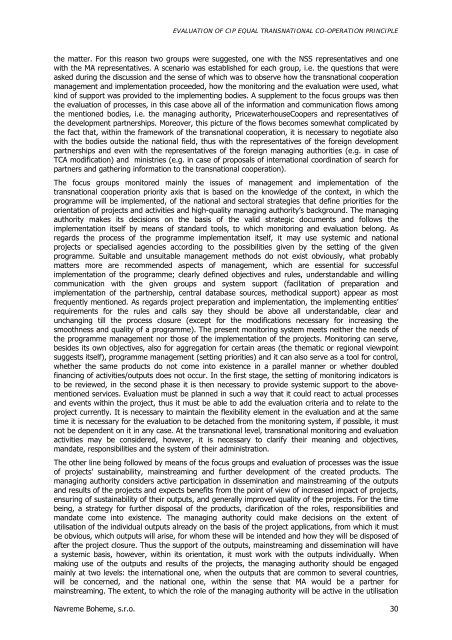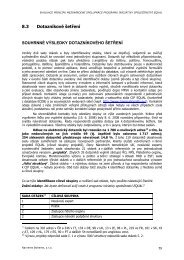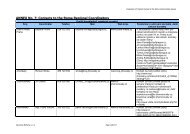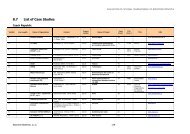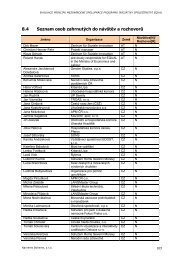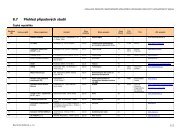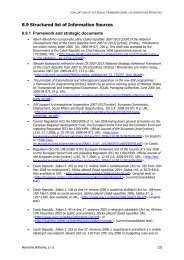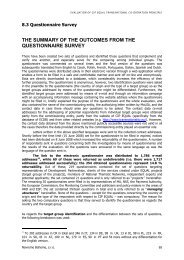EQUAL - Final report - eng - navreme
EQUAL - Final report - eng - navreme
EQUAL - Final report - eng - navreme
Create successful ePaper yourself
Turn your PDF publications into a flip-book with our unique Google optimized e-Paper software.
EVALUATION OF CIP <strong>EQUAL</strong> TRANSNATIONAL CO-OPERATION PRINCIPLE<br />
the matter. For this reason two groups were suggested, one with the NSS representatives and one<br />
with the MA representatives. A scenario was established for each group, i.e. the questions that were<br />
asked during the discussion and the sense of which was to observe how the transnational cooperation<br />
management and implementation proceeded, how the monitoring and the evaluation were used, what<br />
kind of support was provided to the implementing bodies. A supplement to the focus groups was then<br />
the evaluation of processes, in this case above all of the information and communication flows among<br />
the mentioned bodies, i.e. the managing authority, PricewaterhouseCoopers and representatives of<br />
the development partnerships. Moreover, this picture of the flows becomes somewhat complicated by<br />
the fact that, within the framework of the transnational cooperation, it is necessary to negotiate also<br />
with the bodies outside the national field, thus with the representatives of the foreign development<br />
partnerships and even with the representatives of the foreign managing authorities (e.g. in case of<br />
TCA modification) and ministries (e.g. in case of proposals of international coordination of search for<br />
partners and gathering information to the transnational cooperation).<br />
The focus groups monitored mainly the issues of management and implementation of the<br />
transnational cooperation priority axis that is based on the knowledge of the context, in which the<br />
programme will be implemented, of the national and sectoral strategies that define priorities for the<br />
orientation of projects and activities and high-quality managing authority’s background. The managing<br />
authority makes its decisions on the basis of the valid strategic documents and follows the<br />
implementation itself by means of standard tools, to which monitoring and evaluation belong. As<br />
regards the process of the programme implementation itself, it may use systemic and national<br />
projects or specialised agencies according to the possibilities given by the setting of the given<br />
programme. Suitable and unsuitable management methods do not exist obviously, what probably<br />
matters more are recommended aspects of management, which are essential for successful<br />
implementation of the programme; clearly defined objectives and rules, understandable and willing<br />
communication with the given groups and system support (facilitation of preparation and<br />
implementation of the partnership, central database sources, methodical support) appear as most<br />
frequently mentioned. As regards project preparation and implementation, the implementing entities’<br />
requirements for the rules and calls say they should be above all understandable, clear and<br />
unchanging till the process closure (except for the modifications necessary for increasing the<br />
smoothness and quality of a programme). The present monitoring system meets neither the needs of<br />
the programme management nor those of the implementation of the projects. Monitoring can serve,<br />
besides its own objectives, also for aggregation for certain areas (the thematic or regional viewpoint<br />
suggests itself), programme management (setting priorities) and it can also serve as a tool for control,<br />
whether the same products do not come into existence in a parallel manner or whether doubled<br />
financing of activities/outputs does not occur. In the first stage, the setting of monitoring indicators is<br />
to be reviewed, in the second phase it is then necessary to provide systemic support to the abovementioned<br />
services. Evaluation must be planned in such a way that it could react to actual processes<br />
and events within the project, thus it must be able to add the evaluation criteria and to relate to the<br />
project currently. It is necessary to maintain the flexibility element in the evaluation and at the same<br />
time it is necessary for the evaluation to be detached from the monitoring system, if possible, it must<br />
not be dependent on it in any case. At the transnational level, transnational monitoring and evaluation<br />
activities may be considered, however, it is necessary to clarify their meaning and objectives,<br />
mandate, responsibilities and the system of their administration.<br />
The other line being followed by means of the focus groups and evaluation of processes was the issue<br />
of projects’ sustainability, mainstreaming and further development of the created products. The<br />
managing authority considers active participation in dissemination and mainstreaming of the outputs<br />
and results of the projects and expects benefits from the point of view of increased impact of projects,<br />
ensuring of sustainability of their outputs, and generally improved quality of the projects. For the time<br />
being, a strategy for further disposal of the products, clarification of the roles, responsibilities and<br />
mandate come into existence. The managing authority could make decisions on the extent of<br />
utilisation of the individual outputs already on the basis of the project applications, from which it must<br />
be obvious, which outputs will arise, for whom these will be intended and how they will be disposed of<br />
after the project closure. Thus the support of the outputs, mainstreaming and dissemination will have<br />
a systemic basis, however, within its orientation, it must work with the outputs individually. When<br />
making use of the outputs and results of the projects, the managing authority should be <strong>eng</strong>aged<br />
mainly at two levels: the international one, when the outputs that are common to several countries,<br />
will be concerned, and the national one, within the sense that MA would be a partner for<br />
mainstreaming. The extent, to which the role of the managing authority will be active in the utilisation<br />
Navreme Boheme, s.r.o. 30


